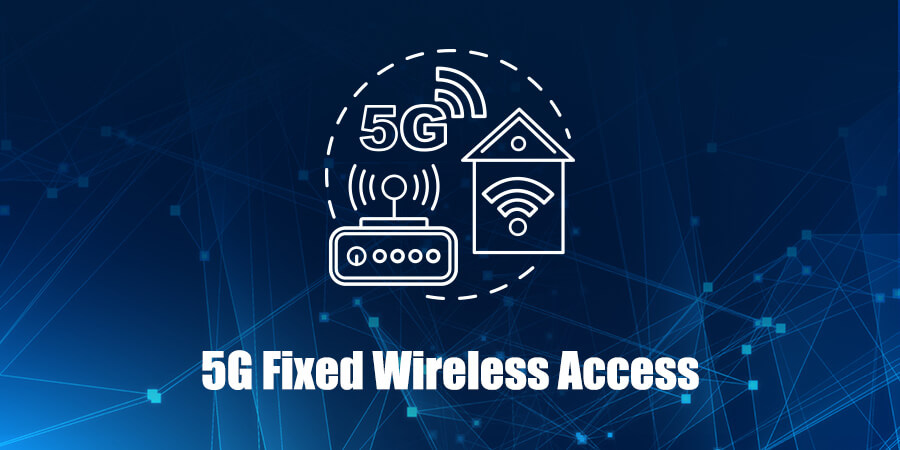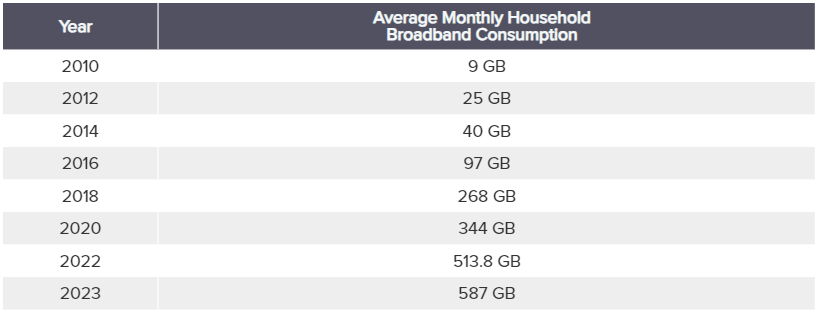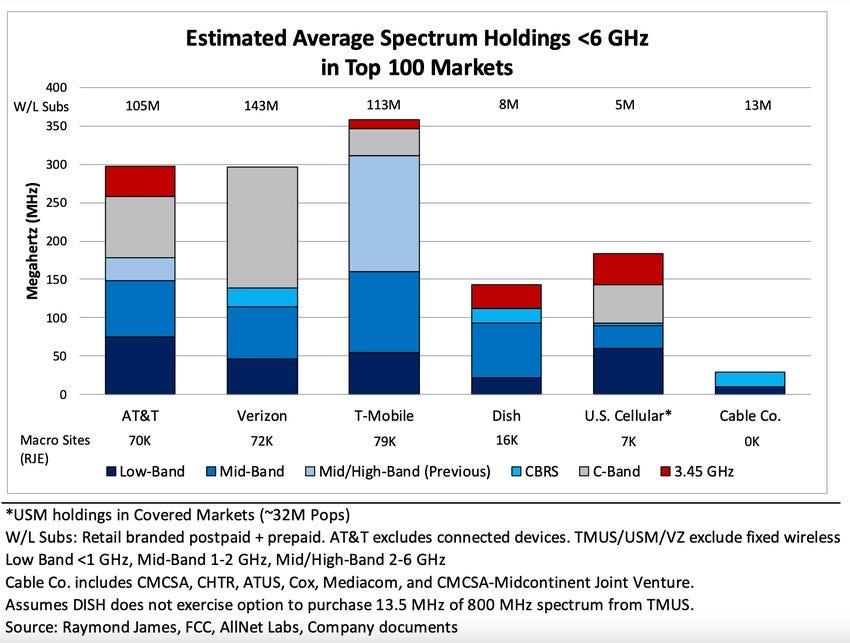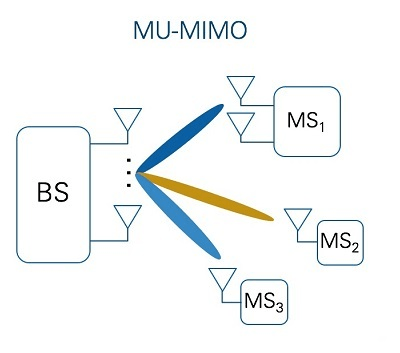FWA: Part 2 - Capacity
Part 2 in series on FWA. This post takes a look at data demand, capacity, FWA subscriber guidance, and new tech that increases network efficiency.
Part 1 was focused on demand, which may have made it seem like FWA was going to take over the broadband industry. It’s a low-cost product with strong demand and 3 nationwide wireless networks competing… Seems like a disaster for the incumbents, right? Well, not quite; capacity is a key limiting factor, and it’s a significant one.
Data Growth
Home broadband data consumption has grown at ~35% CAGR since 2010; growth has slowed to ~15% over the last 5 years but continued double digit growth is a near certainty, with services such as video streaming, virtual reality, and AI continuing to increase demand.
Wireless networks meanwhile have, historically, handled small amounts of data compared to home broadband providers – mostly phone data when not connected to Wi-Fi. Per Ericsson, mobile data traffic averaged ~25GB a month in 2022, ~20x less than current home broadband. Skeptics point to this when claiming 5G home broadband doesn’t make sense for wireless networks. The economics of FWA are ~20x worse than a traditional mobile wireless plan (ARPU between products are similar). Why use up precious network capacity for 5 cents on the dollar, especially in a world where data consumption is growing at a double digit CAGR?
These concerns are valid, but I think there’s some nuance to it. First, there’s little cannibalization between services and there’s not much additional infrastructure needed to provide home broadband (only CPE if you assume no tower densification). Put simply, in locations where capacity is no barrier, the economic comparison isn’t relevant, there’s no real trade-off between FWA and traditional wireless. However, in locations where capacity is scarce, or could be in the future, the economics are extremely relevant, and telcos must diligently manage capacity. Admittedly, telcos build wireless networks with their traditional business in mind, so it’s highly likely most sectors have capacity limitations when factoring in FWA at 20x the data usage.
Telco Guidance
Telcos have provided medium-term subscriber targets to help estimate how much capacity their networks can handle. T-Mobile has guided to ~7-8mm subscribers by the end of 2025. Interestingly, they haven’t increased their guidance, even though demand for FWA has beaten market expectations. Mike Sievert, T-Mobile CEO, provided an update at a UBS conference in December:
“We're right on track. We're really not ahead of schedule. I mean you could say -- if you were to take our roughly 0.5 million net adds quarter and our plan to get to 7 million to 8 million by the end of 2025, you could say we're a little ahead of schedule. And because of that -- and because the TAM on this business opportunity is reasonably finite, you might see us experimenting with rate versus volume kind of dynamics over this next year because we want to make sure that we add the most possible value of the company within this reasonably finite TAM. So you might see some of that, which could affect the 500,000 quarterly run rate, but that would be a net positive.”
This is an interesting admission; a wireless carrier not increasing their guidance despite stronger than anticipated demand. They even discussed playing around with price & volume, to make sure they get the most out of their available capacity (i.e., slower growth and focus on ARPU).
I agree telcos should start to focus on increasing ARPU, given the demand for the product and limited capacity. I also think they should be more deliberate in the customers they target – focus on lower usage customers (avoid 1 Terabyte+ types), maybe by adding a data cap? They’ve boxed themselves in a bit here with their “we’re a simple product and not cable” messaging, but I think this is long-term a viable option.
But the success of the product has to change the economic equation for wireless carriers, at least on the edges. An example is the easiest way to show this. Let’s say there’s a rural town where Cable One is a monopoly provider, charging, on average, ~$85 a month. T-Mobile has enough capacity for traditional wireless, but if they densified, they could offer FWA (with the added benefit of better service for wireless customers). Surely the higher-than-expected demand leads to an increased FWA penetration assumption when assessing these type of projects, potentially flipping some of them NPV positive?
Maybe the answer is T-Mobile perfectly predicted demand. This seems unlikely to me though, and I think there’s a good chance we see the TAM slowly increase post 2025, when T-Mobile finishes their 5G network upgrades and can turn their attention to other capital projects.
To round this out, Verizon has guided to ~4-5mm customers by 2025 and AT&T has begun to push their Internet Air service (no guidance yet). If we’re trying to put a number on medium-term FWA home broadband connections, ~13-15mm is probably a reasonable estimate for the big 3. I think the concern for cable is this number steadily increases post 2025 (i.e., subscriber growth doesn’t hit a wall).
Capacity Enhancement
When it comes to increasing a networks capacity, there are a few options available to wireless carriers:
Network densification
Additional spectrum
Network efficiency
We’ve discussed densification a little bit above, and even though I think demand has potentially created some positive NPV densification projects, it’s not going to massively expand the TAM for FWA. Verizon’s Joe Russo, President of Global Networks & Technology, admitted as much at a recent Wells Fargo conference, saying Verizon’s focus is on macro deployment of their C-band:
“That is our primary focus for our capital dollars (macro C-Band deployment)… I’m not sure if beyond that I see a real need to further densify. It’s a watch and see to some extent. It’s what type of new use cases both in the enterprise or the consumer that require some form of a network upgrade that would require densification.”
This situation may vary by carrier (T-Mobile is furthest along in macro 5G deployment), but it’s fair to say a massive densification push is not happening, at least for purposes of FWA (~20x worse economics…).
Additional Spectrum
Most of the major spectrum sales have occurred for 5G; T-Mobile’s purchase of ~150MHz of 2.5GHz band (through Sprint acquisition) and the $80bln+ C-band auction, where AT&T and Verizon got access to ~250MHz between them, being the key purchases. More spectrum might become available, but it’s reasonable to consider the current spectrum allocations as final.
Verizon is focused on expanding their addressable market for FWA through macro-C-band deployments, AT&T is warming to the product and beginning to push their Internet Air product, and they’ve both just got access to a significant amount of core C-Band spectrum (Verizon and AT&T had access to ~60MHz and ~80MHz before August 2023, respectively) - more capacity is coming as these buildouts mature.
The counter to this is Verizon is already taking price on the product (T-Mobile’s has hinted at this as well), which should start to slow connection growth. I’m not sure this is a victory for cable though; they’re raising prices because they see a path to their FWA subscriber targets with higher ARPU’s (e.g., higher than expected demand). Sure, it highlights that capacity is a constraint, but this was already well understood. To me, increased demand can’t be brushed off by simply saying capacity will stop growth eventually. Increased demand creates optionality; as I said above, it could mean some sectors are viable for densification, or they could target less data intensive customers, increasing the # of households they can serve. I’m not saying I think this is going to be a huge driver, but just ignoring the increased demand doesn’t feel the right answer.
Network Efficiency
This is probably the biggest unknown when it comes to the FWA capacity question; how much more efficient can spectrum be utilized for 5G networks? I’m going to highlight a couple of technologies that industry insiders believe can significantly increase the capacity of wireless networks. It’s obviously difficult to know what efficiency assumptions wireless providers have included in their subscriber guidance, but it useful to understand some of the tech at a high level.
Multiple Input Multi Output (MIMO) uses multiple antennas and receivers to transmit data simultaneously. Networks split the available spectrum into multiple channels, and then send data over the channels at the same time. This is a faster way to send data as it avoids blockages and increases available capacity. MIMO was used on 4G networks, so the technology is not new, but recent advances will help continue increasing wireless network capacity (see MU-MIMO below).
Beamforming is the process of creating a narrower beam to transmit data. It does this by using multiple radiating elements, which send the same signal over the same wavelengths.
The two above technologies have been combined and are now being tested for 5G networks. Called Multi-User MIMO (MU-MIMO), the tech has been used for Wi-Fi, but is new to 5G networks. MU-MIMO allows the same block of spectrum to be shared among multiple users, increasing available capacity. Beamforming is a key part as it beams the signal directly at the device being used; as long as the users are not standing next to each other, there’s no risk of interference and network capacity significantly increases.
Tests performed by Signals Research Group found the MU-MIMO throughput was 75% higher than single-user MIMO. The technology is expected to work well with wireless FWA services, as the CPE is fixed (T-Mobile’s current CPE supports MU-MIMO, but older CPE does not). T-Mobile also performed a MU-MIMO test back in 2020 with similar results. Tests in the lab are one thing, real world application is another, but the point stands that FWA looks to have a reasonable runway to enhance capacity with new technology.
Summary
Capacity is clearly a limiting factor to FWA, wireless carriers have admitted as much via their subscriber guidance (~10% penetration with a nationwide network), and the economics of FWA (~20x worse than wireless) clearly do not justify a significant capex investment in network densification. However, the service is more popular than anyone thought, and assuming this has no impact on the future of FWA is dangerous imo.
I would like to see FWA begin targeting certain types of customers more, low consumption users through things like data caps, which would increase the number of FWA connections their networks can handle. I do worry they’ve backed themselves into a corner with their aggressive messaging though; I think wireless carriers may have underestimated the popularity of FWA, just like the rest of the market.
The next article is going to focus on cables’ response to FWA, as well as broadband subscriber growth trends, and should hopefully clear up why I sold CHTR 0.00%↑. Appreciate you reading.









Frontier discloses that in most of their fiber markets (90% I think) they do not have a competitor that can offer 1g speeds so their success isn’t so much head to head with a strong incumbent such as Charter and Comcast. Charter discloses little overlap with Frontier as well. Further, the fiber guys seem to be mainly cannibalizing their legacy copper footprint which helps prohibit cable from winning those customers but again I don’t see it as fiber taking share of existing cable customers. We’ll see how that develops but again I think Charter measures up well on service offerings and price.
Last thing. For the discerning customers, FWA is not low cost when measured on price per gig, or MB, of speed. Charter is much cheaper on this basis and this is what I’m referring to as low cost. Now I acknowledge there are consumers who will not look at it that way. I think cable, through advertising, could educate local customer bases better about cost, speed, and the bundle packages available that are superior products at better prices versus FWA.
Look forward to the next series.
Thanks again for the article and research. Interesting read as always. The comments from VZ and TMUS execs are interesting regarding price versus volume, finite TAM, and how their growth is tracking initial business plans for 2025 estimates.
In reading these articles, I come back to a couple items: 1) broadband customers are price sensitive, and 2) customers expect reliable, no issue service, at high enough speed. It doesn’t matter so much WHO provides that just that they get it. Key word on speed being just enough.
With that, I think fiber overbuilders are in the worst position of any broadband provider. Frankly I think fiber offers speeds that are well beyond what the average household needs (families, couples, etc.) yet they need customers to subscribe to the higher end service plans at higher ARPU to make any return. But they still have to outcompete incumbents who offer enough speed at lower price. Who really needs 2.5g+ home internet? 1g service might be well above most households needs.
Curious your thoughts on my point on fiber? To me the end game is who can offer enough speed at the lowest price. In a commodity business, like this one, being the low cost provider is a true advantage.